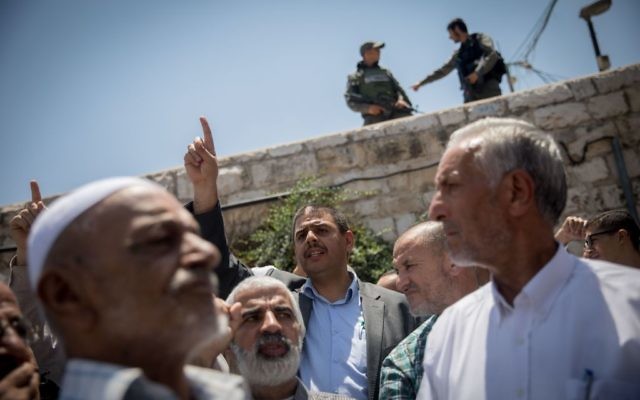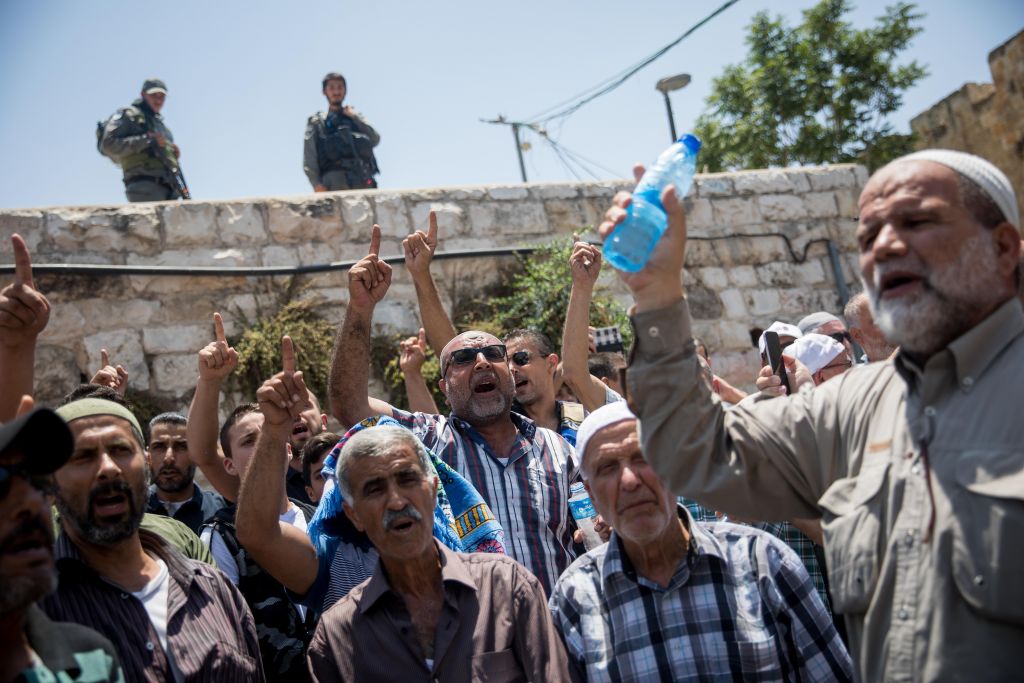Three Israelis murdered in West Bank home during Shabbat
Palestinian sneaks settlement of Halamish in the West Bank and kill three Israelis, after police kill three protesters amid Temple Mount tensions

Escalating Israeli-Palestinian tensions over the Holy Land’s most contested shrine boiled over into violence on Friday that killed six people, three Palestinians in street clashes in Jerusalem and three Israelis in a stabbing attack at a West Bank settlement.
After nightfall, a

Photo by: JINIPIX
and stabbed to death three Israelis, the head of Israel‘s rescue service said.
An Israeli news site said those killed were two men and a woman who were having dinner at the time.
The army released footage showing a blood-covered kitchen floor.
Israel TV’s Channel 10 said the assailant was in his late teens and had posted on Facebook that he was upset by the events at the shrine.
Eli Bin, the head of Israel‘s rescue service MDA, said an off-duty soldier next door heard screams, rushed to the home and shot the attacker through a window.
Mr Bin said the attacker was wounded and evacuated to hospital.
Palestinian president Mahmoud Abbas, meanwhile, announced he is freezing ties with Israel, dealing a blow to fledgling Trump administration efforts to try to renew long-dormant peace talks.
Mr Abbas said contacts with Israel would be suspended on “all levels.”
It was not immediately clear if this means long-standing security coordination betweenIsraeli troops and Abbas’ forces will be halted.
At issue in the current round of violence are metal detectors Israel installed at the Jerusalem shrine earlier this week, in response to a deadly attack by Arab gunmen there.
The metal detectors are perceived by the Palestinians as an encroachment on Muslim rights and portrayed by Israel as a needed security measure following the attack that killed two Israeli policemen.
Earlier Friday, several thousand Palestinians in Jerusalem and the West Bank clashed withIsraeli troops, burning tires or throwing stones and firecrackers.
Troops fired live rounds, rubber bullets and tear gas.
Three Palestinians were killed and several dozen taken to hospital with live or rubber bullet injuries.
White clouds of tear gas rose from Jerusalem streets and West Bank flashpoints.
In one neighbourhood, Palestinians threw stones from behind a mattress used as a shield.
Israel also faced growing criticism from the Muslim world, and thousands staged anti-Israel protests after Friday prayers in Jordan and Yemen.
Turkey and Egypt also condemned the violence.
The confrontations in the Holy Land could escalate in coming days, as both sides dig in.
Israel said the metal detectors would remain in place.
Politician Tzachi Hanegbi, a confidant of prime minister Benjamin Netanyahu, said Israelwould not surrender to what he said were “violence and incitement” by those “attempting to drag us into a religious war”.
Jerusalem’s top Muslim cleric, Mohammed Hussein, said protests, including mass street prayers outside the shrine, would continue until the devices are removed.
He told worshippers Friday that they should prepare for a “long test of wills” with Israel.
“We will not back off,” he said.
The shrine, revered by Muslims and Jews, sits at the emotional epicentre of the Israeli-Palestinian conflict, symbolising the rival religious and national narratives of the two sides.
Disputes over the 37-acred walled hilltop platform in Jerusalem’s Old City have repeatedly triggered major confrontations in the past.
Earlier this week, Israel began installing metal detectors at the gates of the compound, saying extra measures were required to prevent further attacks.
Muslim leaders portrayed the metal detectors as part of a purported Israeli campaign to expand its control over the shrine, a claim Israel denies.
Muslim clerics urged worshippers to pray in the streets near the shrine, rather than submit to the new security procedures.
The faithful complied. Thousands flocked to the Old City each day this week for street prayers, kneeling on mats spread on cobble stone and asphalt.
On Friday, the highlight of the Muslim religious week, Israeli police severely restricted Muslim access to the Old City to prevent mass protests.
Some 3,000 officers were deployed at checkpoints in and around the city, turning away Muslim men under the age of 50, including those trying to reach the city from Israel and the West Bank.
In the end, thousands reached the Old City, a fraction of the typical Friday turnout of tens of thousands of worshippers.
After peaceful prayers, clashes erupted in several areas of Jerusalem and across the West Bank.
Palestinian health officials said three Palestinians were killed by live fire in different areas of Jerusalem.
The Red Crescent said 390 Palestinians were hurt, including close to 100 who were taken to hospital for live fire or rubber bullet injuries.
Israeli police said five officers were wounded.
The perceived threat to the shrine, home to the Al Aqsa and Dome of the Rock mosques, has galvanised Palestinians, especially those in east Jerusalem which was captured byIsrael in the 1967 Mideast war and quickly annexed.
Since 1967, Israel has increasingly cut off east Jerusalem from its West Bank hinterland, leaving the city’s Arab residents without a political leadership.
Muslim clerics stepped into the void this week, taking the lead in prayer protests.
Under the post-1967 arrangements, Muslims administer the compound. Jews can visit, but not pray there.
For decades, the status quo held, in part because leading rabbis, citing religious purity laws, banned Jews from entering.
In recent years, religious opinion has shifted, and growing numbers of Jews are visiting the compound.
This shift has stoked Muslim fears of a purported Israeli plan to expand Jewish control there. Israel has reiterated that it has no intention to change the status quo.
Fakhri Abu Diab, a 55-year-old worshipper, said he feels Muslims must stand their ground.
“If we let them, they (Israelis) will take over the mosque completely,” he said, standing near the Old City.
“If we resist them, they will stop.”
The dispute over the detectors has led to rising tensions between Israel and the Muslim world.
The compound is the third holiest site of Islam, after Mecca and Medina in Saudi Arabia.
It is also Judaism’s holiest site, once home to biblical temples.
Jordan, the custodian of the Jerusalem shrine, has repeatedly appealed to Israel to remove the devices.
The two countries cooperate closely on regional security issues, but frequently disagree on Israel‘s policies at the shrine.
On Friday, several thousand Jordanians protested against Israel in the Jordanian capital of Amman.
Demonstrators chanted, “the people want to liberate Al Aqsa”, referring to one of the mosques in the compound.
Turkish prime minister Binali Yildirim said his country is in touch with Israeli officials to try to end the crisis.
Speaking in Ankara after Friday prayers, he called Israel‘s security measures “radical,” saying limits imposed on Muslim prayers would not contribute to a solution.

Thank you for helping to make Jewish News the leading source of news and opinion for the UK Jewish community. Today we're asking for your invaluable help to continue putting our community first in everything we do.
For as little as £5 a month you can help sustain the vital work we do in celebrating and standing up for Jewish life in Britain.
Jewish News holds our community together and keeps us connected. Like a synagogue, it’s where people turn to feel part of something bigger. It also proudly shows the rest of Britain the vibrancy and rich culture of modern Jewish life.
You can make a quick and easy one-off or monthly contribution of £5, £10, £20 or any other sum you’re comfortable with.
100% of your donation will help us continue celebrating our community, in all its dynamic diversity...
Engaging
Being a community platform means so much more than producing a newspaper and website. One of our proudest roles is media partnering with our invaluable charities to amplify the outstanding work they do to help us all.
Celebrating
There’s no shortage of oys in the world but Jewish News takes every opportunity to celebrate the joys too, through projects like Night of Heroes, 40 Under 40 and other compelling countdowns that make the community kvell with pride.
Pioneering
In the first collaboration between media outlets from different faiths, Jewish News worked with British Muslim TV and Church Times to produce a list of young activists leading the way on interfaith understanding.
Campaigning
Royal Mail issued a stamp honouring Holocaust hero Sir Nicholas Winton after a Jewish News campaign attracted more than 100,000 backers. Jewish Newsalso produces special editions of the paper highlighting pressing issues including mental health and Holocaust remembrance.
Easy access
In an age when news is readily accessible, Jewish News provides high-quality content free online and offline, removing any financial barriers to connecting people.
Voice of our community to wider society
The Jewish News team regularly appears on TV, radio and on the pages of the national press to comment on stories about the Jewish community. Easy access to the paper on the streets of London also means Jewish News provides an invaluable window into the community for the country at large.
We hope you agree all this is worth preserving.





















